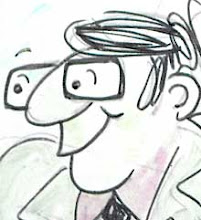 Fifteen years ago I went to perhaps the creepiest place I have visited. Deep in a forest outside Kętrzyn in northern Poland are the shattered remains of Wolfschanze, the 'Wolf's Lair', Hitler's principal HQ during Barbarossa - a gloomy clearing where the guide will tell you 'Hitler lived there, Goering just across the road....', and where you can see the site of von Stauffenberg's failed bomb attempt. The Nazis did their best to blow it all up before they left, also generously seeding the surrounding area with landmines. These, I was told, were finally cleared by young Polish Pioneer 'volunteers' during the 1950s - perhaps the most macabre twist of all.
Fifteen years ago I went to perhaps the creepiest place I have visited. Deep in a forest outside Kętrzyn in northern Poland are the shattered remains of Wolfschanze, the 'Wolf's Lair', Hitler's principal HQ during Barbarossa - a gloomy clearing where the guide will tell you 'Hitler lived there, Goering just across the road....', and where you can see the site of von Stauffenberg's failed bomb attempt. The Nazis did their best to blow it all up before they left, also generously seeding the surrounding area with landmines. These, I was told, were finally cleared by young Polish Pioneer 'volunteers' during the 1950s - perhaps the most macabre twist of all.Lesser known is Hitler's Ukrainian HQ, Wehrwolf, near Vinnytsia in Ukraine, which I sought out on Sunday. Arriving in the town by train and wondering where I could get any information, I stumbled across the one institution which would certainly be able to tell me all about it - the local synagogue. Not only that, but Josef, who was hanging around in the office, had nothing to do and also had a car -he would take me there and show me around.
In the ten years 1935-1945 Vinnytsia saw as much or more cold-blooded murder as almost any other corner of Europe. The Nazis were delighted, on taking control of the region, to discover and publicize the mass graves of nearly 10,000 Ukrainians executed by the NKVD -Ukraine's Katyn. They went on vastly to exceed this terror with the murder of local Jews, Ukrainians and POWs. Like many other such towns in Poland and Ukraine, Vinnytsia's present relative prosperity belies its horrific past. Out along the main roads, smart new houses have been built - so you might not notice the sign indicating the sideroad to Wehrwolf. Indeed even if you saw it, you might wonder if you were on the right route, as the bright new villas continue up to and opposite the site.
Not that there turns out to be much to see. There is the open-air swimming pool (above) constructed for the Fuhrer's personal use, and a few scattered concrete blocks. As it happens, Hitler only spent a few weeks in total at Wehrwolf, and probably never used the pool - constructed, like the rest of the site, by forced labour. What the Nazis
 themselves didn't destroy, including the system of underground bunkers, was thoroughly dismantled by the Soviets. Rather more disconcerting than any potentially sinister remains was the number of local folk casually picnicking on the site, many equipped with portable barbecues.
themselves didn't destroy, including the system of underground bunkers, was thoroughly dismantled by the Soviets. Rather more disconcerting than any potentially sinister remains was the number of local folk casually picnicking on the site, many equipped with portable barbecues.Just the other side of the highway -and also surrounded by smart new housing, a hotel and a sports centre - Josef showed me another memorial, not directly visible from the road. It stands on another mass grave, where 14,000 Russians, Czechs, Poles, Norwegians and others were dumped by the Nazis. We walked meditatively away, to the plunk of volleys from the adjoining tennis courts.

















